Beat licensing is one of the most pivotal ways to monetize music production and secure a place in the super-competitive music industry.
So, as a music producer or artist, it’s important to understand what a beat lease contract is and how to handle licensing like a boss.
This way, you’ll be able to maximize your creative output and financial returns.
Knowledge like this is not only beneficial for protecting your work but also essential for building professional relationships within the music industry.
It will help ensure that both producers and artists can collaborate effectively, with clear expectations and mutual benefits.
In today’s article, we’ll break down:
- What a beat lease contract is (+ key components) ✓
- Different types of beat licenses ✓
- Non-exclusive licenses vs exclusive licenses ✓
- Creating and negotiating the perfect beat lease contract ✓
- Platforms for selling beats & leasing beats ✓
- Copyright and publishing rights ✓
- Avoiding copyright infringement ✓
- Deciding between exclusive beats & non-exclusive beats ✓
- Strategies for maximizing profits through a beat license agreement ✓
- Much more about beat lease contract essentials ✓
You’ll have a solid understanding of beat licensing, including non-exclusive beats and exclusive agreements.
This way, you can confidently take care of business like a professional.
Whether you’re just starting out or looking to refine your approach to beat leasing and sales, this guide is key.
It will give you the essential knowledge needed to manipulate and master any beat lease contract with ease.
So, let’s dive in…
Table of Contents
What is a Beat Lease Contract?
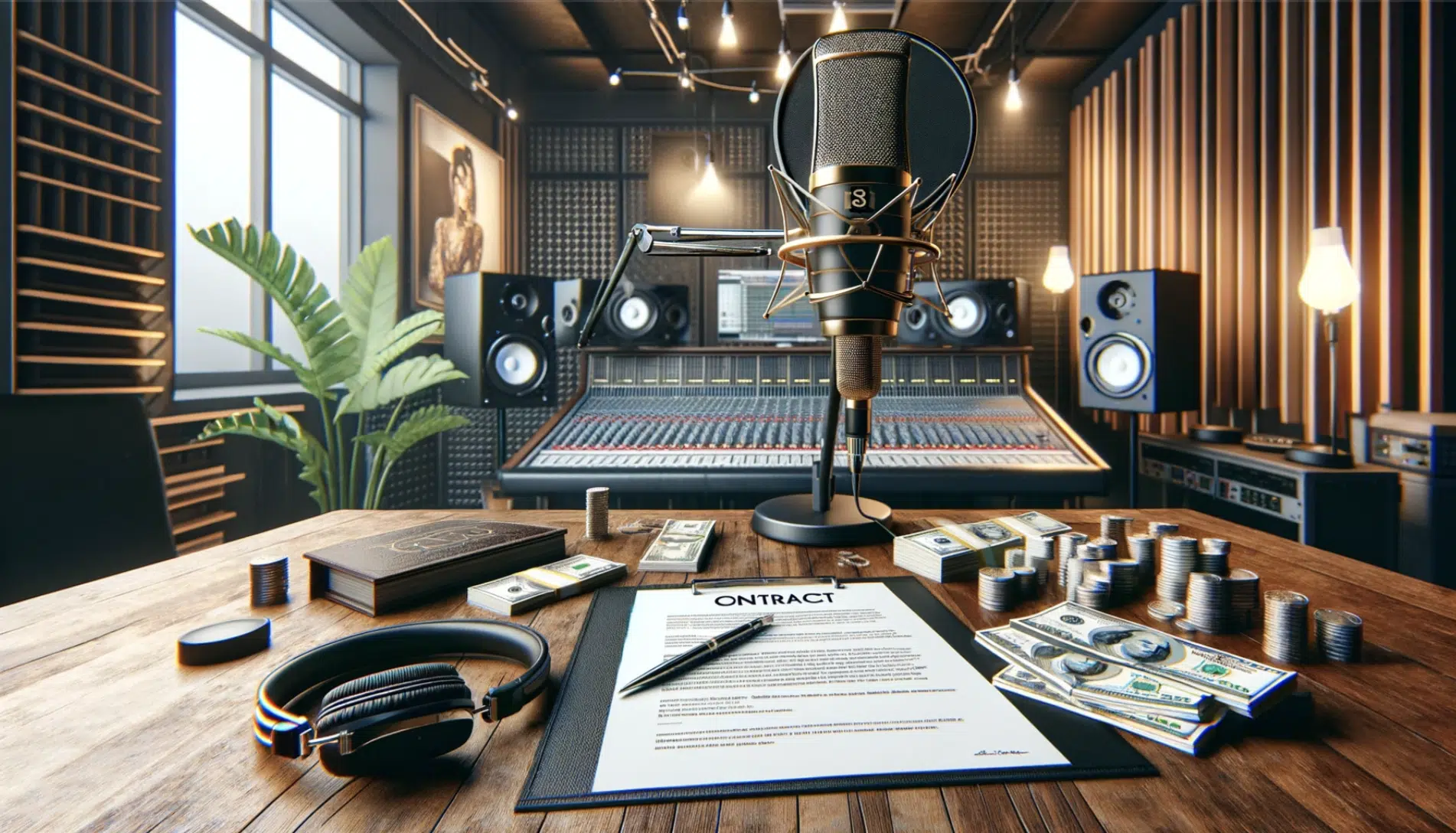
A beat lease contract is essentially a license agreement between a producer and an artist that allows the artist to use the producer’s beat for their music.
Unlike selling a beat outright, leasing beats offers a more affordable option for artists while providing producers with a continuous revenue stream.
A beat lease contract specifies the terms under which the artist can use the beat, such as the:
- Duration of the lease
- Types of media it can be used in
- Limitations on distribution or sales
Understanding beat lease contracts is super important for both producers and artists.
For producers, it’s a way to protect their work and ensure they are compensated fairly.
For artists, it provides a legal framework that allows them to use professional-quality beats without the upfront cost of purchasing exclusive rights.
These contracts balance the needs and rights of both parties, making them a staple in the digital music production landscape.
-
Note: For Music Producers
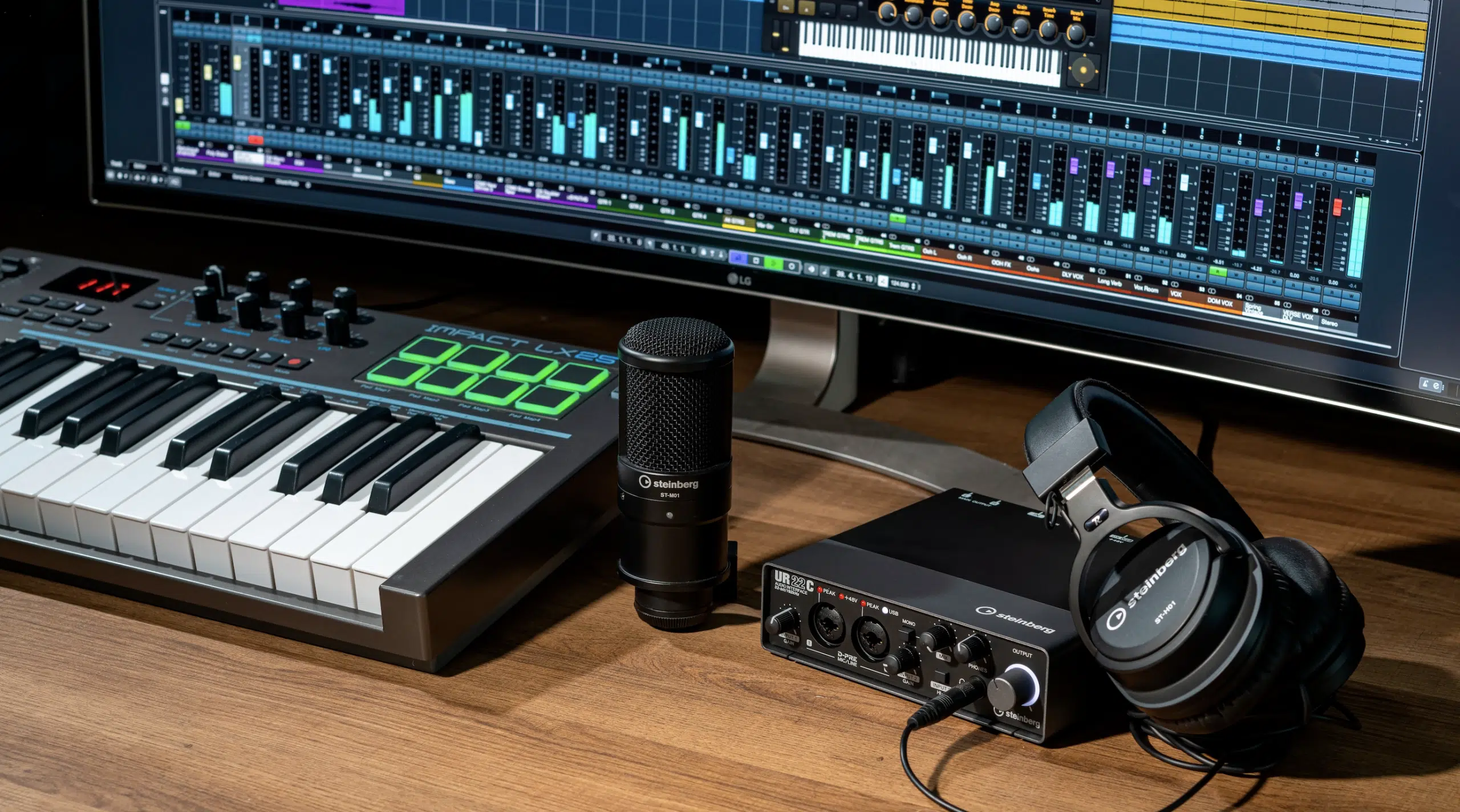
Beat lease contracts are the ultimate tool for monetizing your creations.
By leasing beats, producers can sell the same beat to multiple artists 一 maximizing their earning potential.
It also allows for a broader distribution of their work, increasing their visibility and reputation in the industry.
-
Note: For Artists
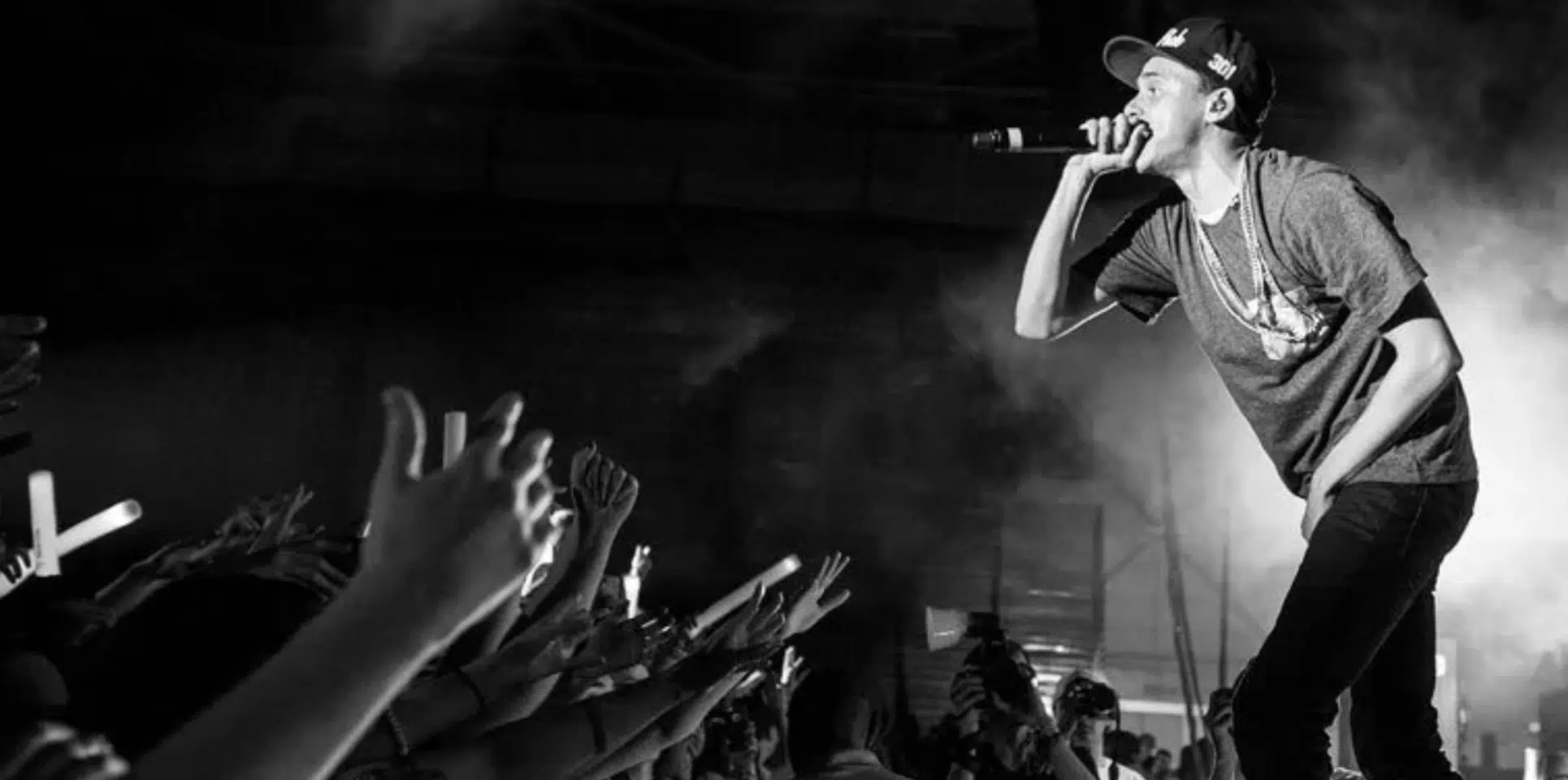
Artists, on the other hand, benefit from the flexibility and affordability that beat leasing offers.
They gain access to high-quality production without the significant investment required for exclusive beats.
This arrangement enables artists to release more music, experiment with different styles, and grow their fan base without breaking the bank.
Understanding Different Types of Beat Licenses
Mastering the world of beat licensing can be daunting, with various options available to both producers and artists. So, let’s break down the two primary types of licenses: non-exclusive licenses and exclusive licenses. This way, you’ll understand their differences and how they can impact your music and future profits.
-
Non-Exclusive License Agreement
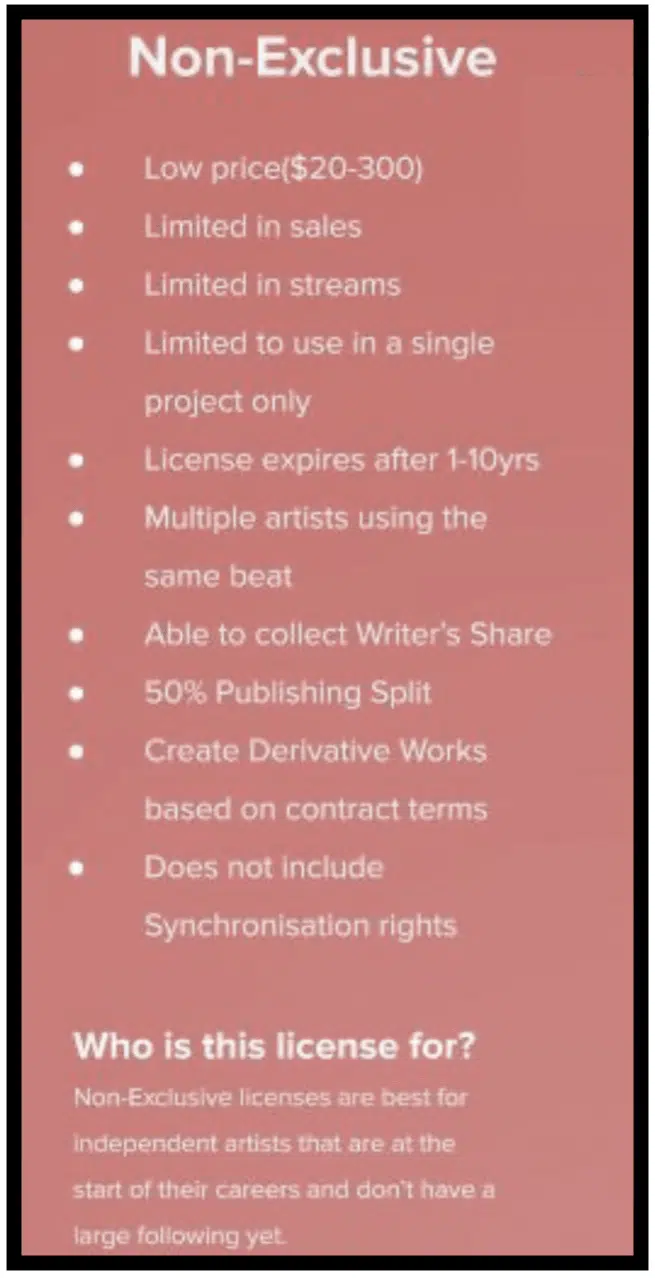
A non-exclusive license agreement (for non-exclusive beats) is a great way for both aspiring beat-makers and seasoned music producers alike.
It offers you an opportunity to monetize your beats while retaining copyright ownership.
This type of agreement permits multiple artists to lease the same instrumental beat, amplifying the beat’s commercial reach and profitability.
For example, if you produce a catchy hip-hop beat and list it on a popular online beat store, you can enter into non-exclusive agreements with several artists.
All it takes is one electronic signature and two happy parties.
Each artist will pay a set amount to use the beat in their projects, like mixtapes or EPs, under predefined conditions in the beat license agreement.
This includes things like music distribution limits and usage rights.
Basically, a non-exclusive license agreement is a steady income stream from a single non-exclusive beat.
-
Pro Tip
When it comes to non-exclusive license agreements, it’s key to explicitly break down the usage terms.
This may include certain limitations in the beat license agreement regarding your non-exclusive beat, like:
- Streaming numbers
- Downloads
- Music videos
- Radio play
- Public performances
- Other general terms
It ensures that the beat’s usage is regulated and fair for all leasing artists.
An excellent example of a non-exclusive beat restriction could be setting a cap of 500,000 streams on major platforms such as Spotify or Apple Music before an additional license fee is required.
This approach not only keeps the playing field level for all artists leasing the same beat but also protects the producers’ interests.
-
Exclusive License Agreement: Exclusive Rights Broken Down
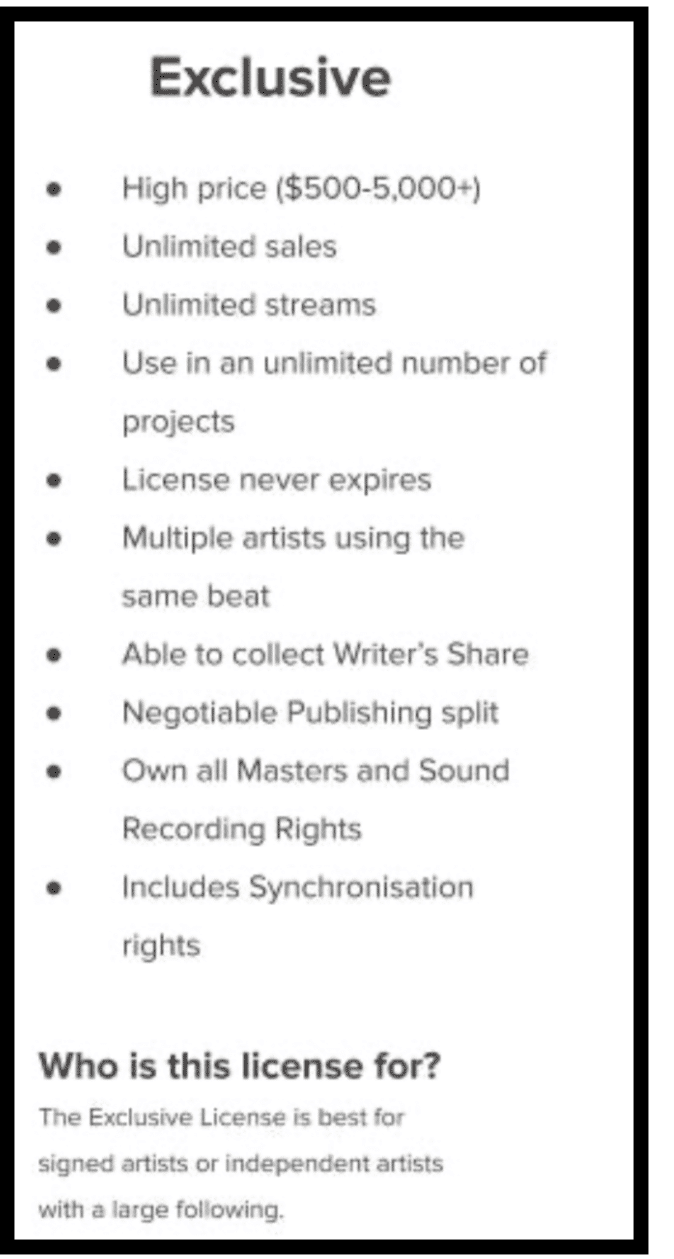
An exclusive license agreement, on the other hand, offers the ultimate form of partnership and personalization between a music producer and the other party (artist).
Exclusive rights ensure that once a beat is sold, it becomes the exclusive property of the purchasing artist.
Meaning, it’ll get erased from the beat market entirely without a trace.
Side note, if you’d like to learn everything about selling beats in detail, we’ve got you covered.
Exclusive beats are highly sought after by professional artists aiming to create a mind-blowing sound or an electronic signature song that stands out in their genre.
For example, you might develop a unique instrumental beat that perfectly aligns with an artist’s upcoming album theme…
Upon selling exclusive beats, the entire agreement guarantees that no other artists will have access to it (pretty simple, right?).
This both adds intrigue to the unique beat itself and helps the artist have some real uniqueness points.
-
Pro Tip
An exclusive license agreement is jam-packed with as much detail as you could imagine, and then some.
It covers factors like the:
- Transfer of full ownership
- Rights to make derivative works
- Specifics of royalty sharing
A good example would be a producer and an artist (the licensee agrees) agreeing on an exclusive license for a beat that becomes the lead single of a highly anticipated album.
The exclusive rights contract may include clauses for sharing royalties from sales, streams, and even performances.
It ensures the producer receives a fair share of the financial success resulting from their creative contribution.
Side note: exclusive agreements should always feature general terms about crediting the producer 一 maintaining a mutually-beneficial relationship.
I mean, if you’re creating or producing a song, you have the right to want recognition for that song.
So, if you’re looking through a beat lease contract and find yourself confused about anything (or see something missing/wrong), never sign until it’s ironed out.
Beat Licensing 101: Breaking it Down
The sale and distribution of beats online has completely revolutionized how we (as producers) connect with artists worldwide.
Meaning, you’ve got to understand the beat license game thoroughly so your unique song gets the recognition it deserves.
Let’s start with the best platforms for leasing beats, so you can maximize your reach and income:
-
Airbit

Known for commission-free sales and a variety of features including custom licenses and contracts, Airbit is a top choice for new and experienced producers alike.
It offers automatic voice tag additions (producer tags) to your beats for a protection point and integrates well with social media and mailing lists.
-
BeatStars

BeatStars is a super solid platform for most producers looking to make money through leasing beats, collaboration, and streaming.
This beat license site has a sick producer community and collaboration 一 offering apps and streaming services to help artists earn per play.
-
Traktrain

Traktrain is an invite-only service catering primarily to the hip hop songs, offering a platform for producers to sell their beats directly to artists.
It features a 0% fee on producer sales and offers both free and paid membership options; some even have added benefits like extra uploads and scheduled posting.
-
SoundClick
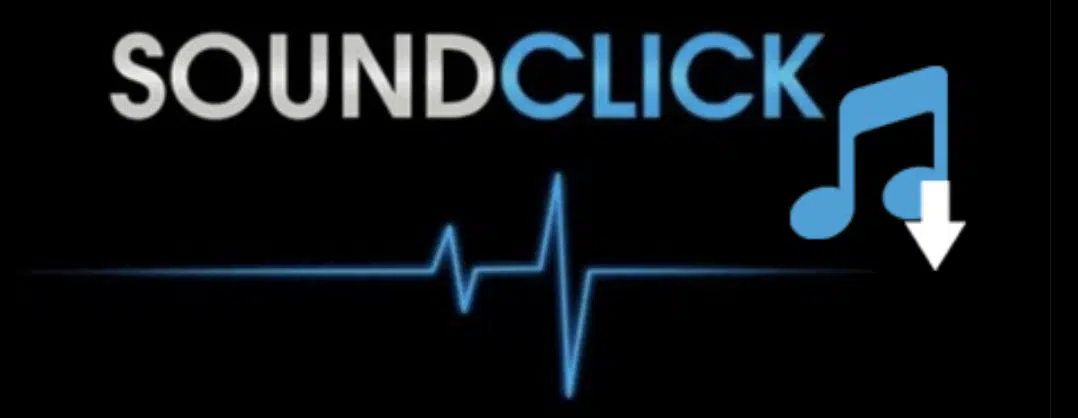
While it has been around since 1997 and might have a somewhat dated business model, SoundClick still offers a vast (and eclectic) sound library.
This beat license site caters especially to the hip-hop and rap communities 一 providing both a platform for beat leasing and complete tracks with vocals.
-
Soundee

Soundee offers a sleek interface for selling beats, with commission rates lowering based on subscription level.
While not as popular as Airbit, BeatStars, and some other beat license contract sites, it’s great for artists aiming to increase their streams and sales through social media.
-
Soundgine

Soundgine is ideal for experienced music producers looking for a beat license platform with zero commission fees.
Although it lacks a free version, Soundgine’s focus is on maximizing profit for its users, meaning this beat license site promises a huge audience despite its more narrow library.
Copyright and Publishing Rights Agreement
Understanding the intricacies of copyright and publishing rights is non-negotiable when entering into any beat licensing agreement. When you’re leasing beats, it’s important to know that everything in relation to the beat license process is in order.
-
Copyright Agreements
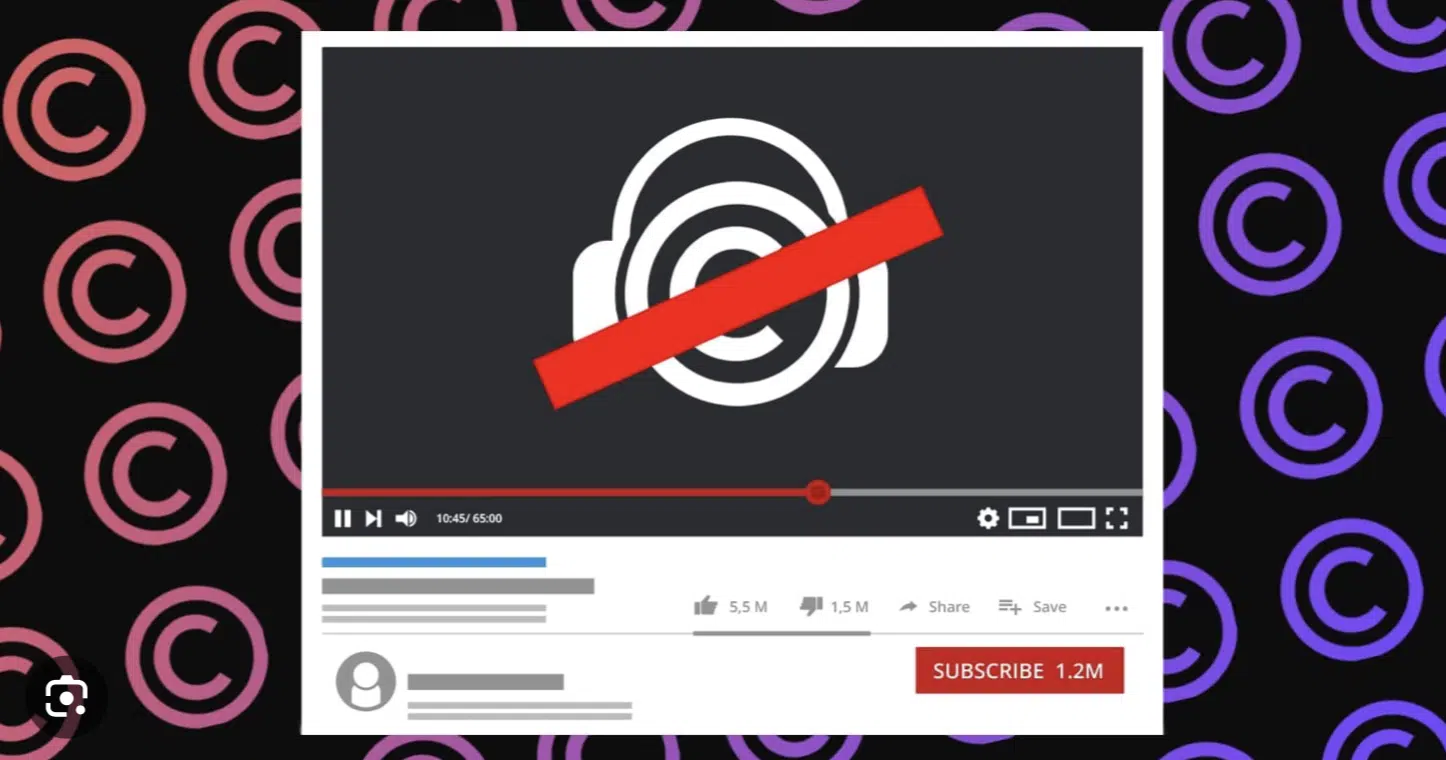
In a beat lease contract, it’s essential to clearly state how copyright is handled.
It ensures that you retain ownership of the instrumental while giving the artist permission to use it for their creative projects.
The agreement should explicitly detail the rights the artist is acquiring (and specific purposes), such as the ability to use the beat for:
- Master recording
- Performance
- Distribution
While also outlining any limitations on those rights too, of course.
-
Publishing Rights Agreements
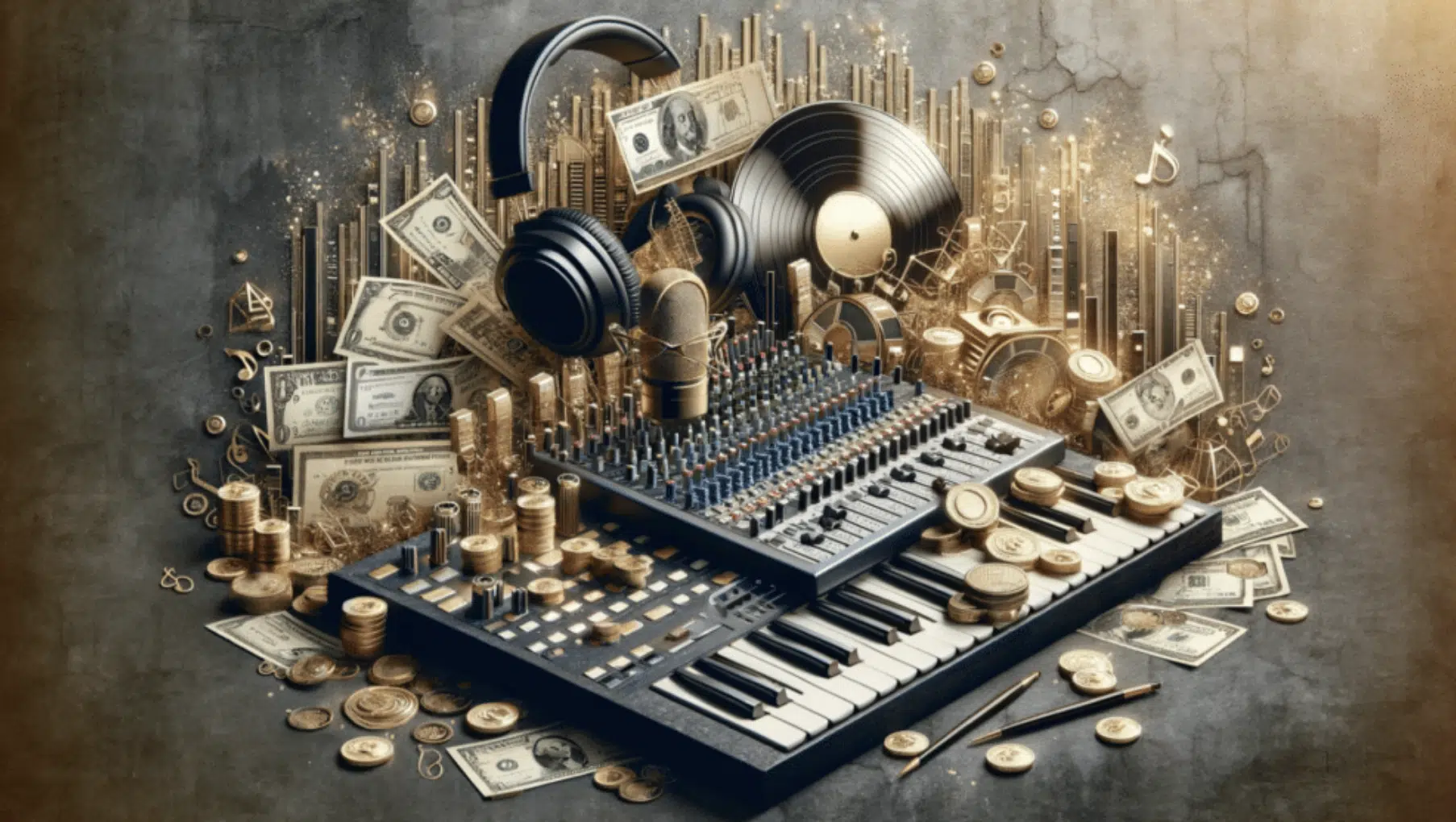
Publishing rights are another key component, particularly when it comes to exclusive beats.
You should always put into place general terms that make sure you’re fairly compensated (money-wise) when you sell your song.
This could potentially include a percentage of royalties as well as other financial terms.
This arrangement provides an ongoing revenue stream from a successful track, whether it’s an exclusive or non-exclusive beat.
Plus, gives props to the producer for their role in the creative process (for example, you might retain a certain percentage of publishing rights).
It ensures (in the beat lease contract) they receive royalties for their beat whenever that unique song is used in radio play/by radio stations or performed live.
-
Pro Tip: Avoiding Copyright Infringement
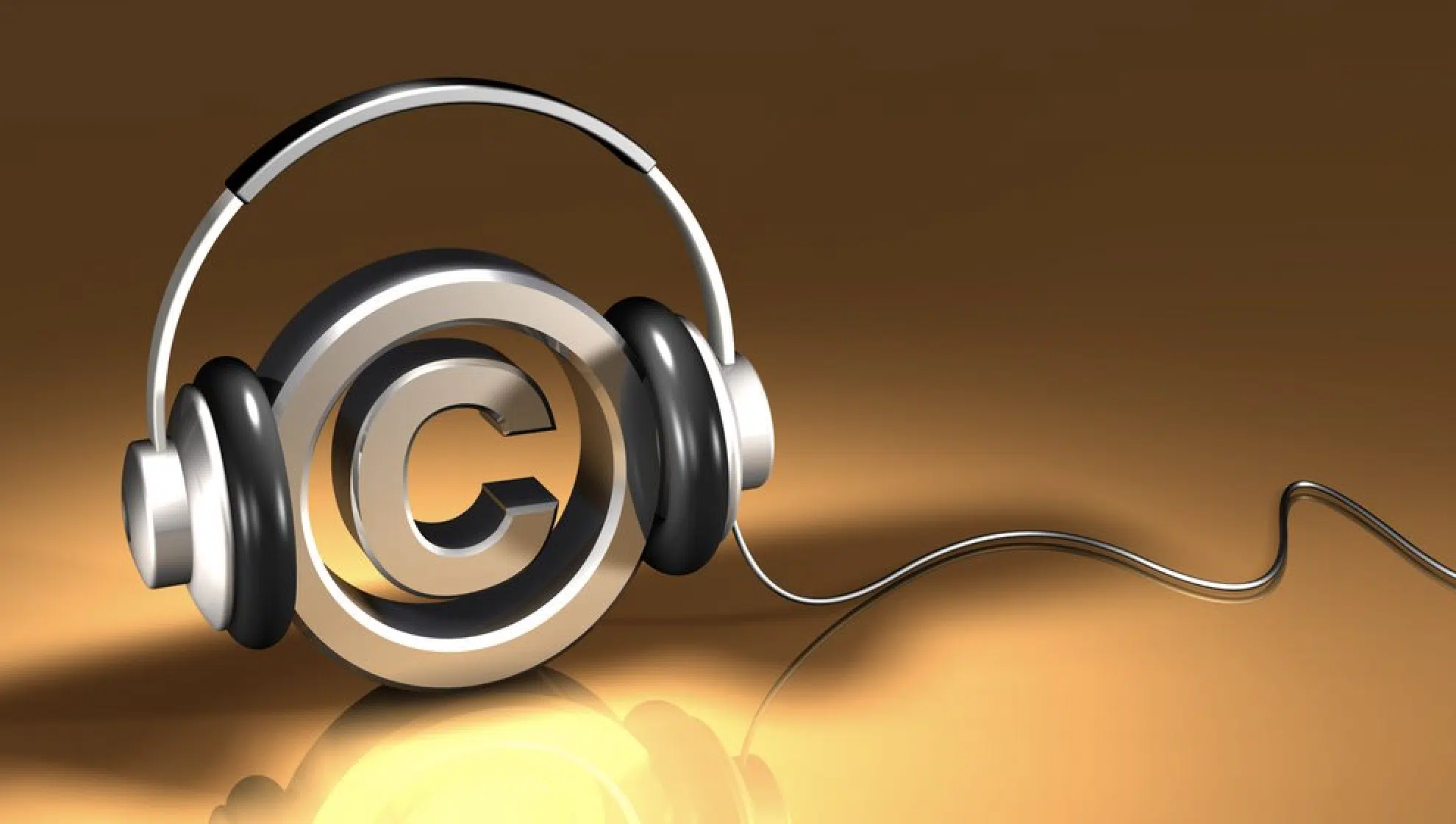
To protect yourself against copyright infringement, it’s vital to ensure all samples and loops used in your beats are cleared or royalty-free.
It prevents potential legal action/issues (like copyright infringement) for both the producer and the other party/parties, aka the artist, using the beat.
Utilizing original compositions or purchasing licenses for samples can have some risks and maintain the integrity of the music.
Remember, transparency with artists about the use of samples, promotional use, and the status of their clearance is everything when it comes to trust and professionalism in every beat license agreement.
Exclusive Rights vs. Non-Exclusive Rights: Making the Right Choice For You
Choosing between non-exclusive rights and exclusive rights contracts depends largely on the goals and resources of the producer and artist (or other parties).
Needless to say, picking the right beat license for you boils down to a few key factors.
So, knowing the differences is key whether you’re considering buying exclusive rights, just signed a license agreement, or need information for the future.
-
Exclusive Rights: Pros/Cons
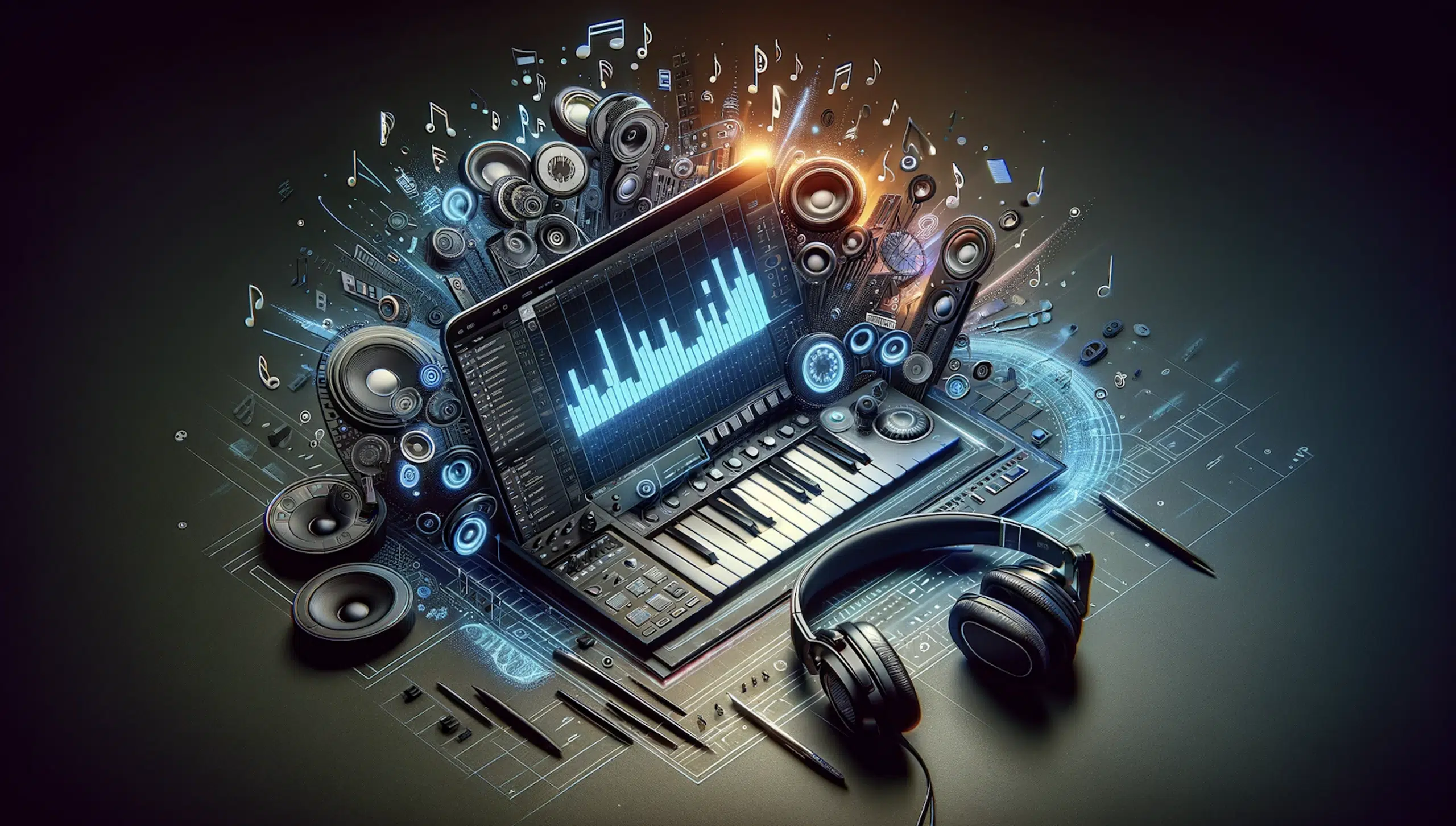
Exclusive rights offer the advantage of full control over the beat 一 allowing artists to create a unique sound that can’t be replicated by others (sound design, anybody?).
The exclusivity of this beat lease contract can be vital for artists aiming for a distinctive brand identity or those with a specific vision for their music’s production quality.
However, exclusive rights come at a higher cost, as they will be sold to one person only.
So, if you’re looking to either offer or sign an exclusive rights contract, make sure to consider all the license variables.
-
Non-exclusive Rights: Pros/Cons
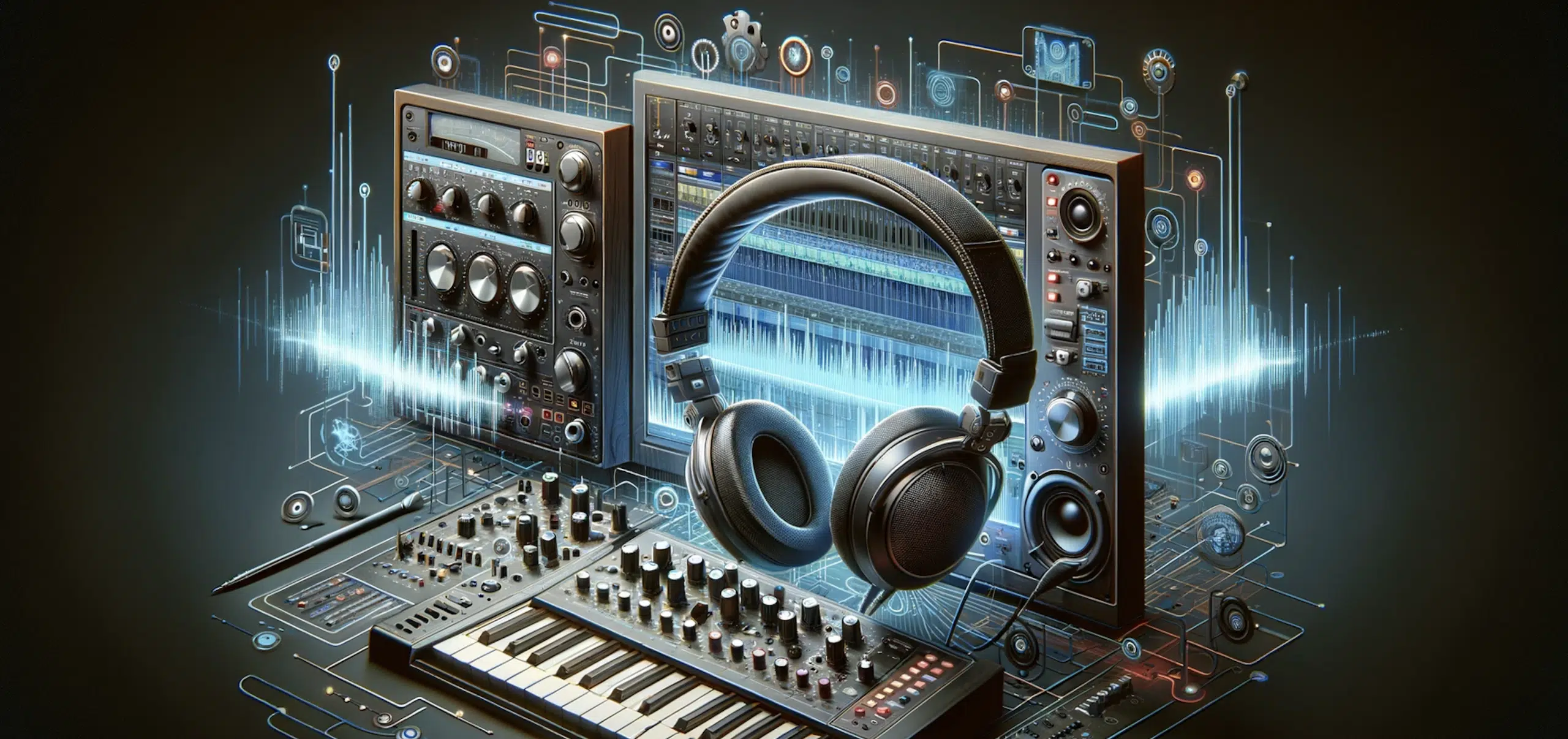
On the other hand, non-exclusive rights provide a more affordable option to help artists with finding beats that are high-quality.
While, at the same time, allowing most producers to maximize their earnings by licensing the same beat license to multiple artists.
This option is ideal for artists in the early stages of their music careers or those working on projects with tighter non-exclusive beat budgets.
Ultimately, the decision should be guided by the artist’s specific needs and the strategic goals of their project.
Bottom line, you’ve got to weigh the benefits of exclusivity against the cost and potential limitations of a non-exclusive beat.
As a producer attempting to sell a non-exclusive beat can actually mean a pretty penny every time the song is used 一 depending on the terms in the beat license agreement.
Beat Lease Contract: Final Thoughts
Leasing and selling beats is a tricky game that can elevate your music career and expand your professional network.
If you don’t understand how a beat lease contract works, you’re going to miss out on potential earnings and, worse, possibly face legal complications.
A beat lease contract gone wrong can affect your reputation and reliability in the music industry, and nobody wants that.
Luckily, you now know how to navigate the complexities of beat lease contracts, so you can make informed decisions about your music with ease.
Now, to go along with all this knowledge, you’ll need the absolute hottest samples for those beats you’re planning to lease…
This is where the highly-renowned Beatmaker Blueprint (Free Teaser) comes in.
This invaluable pack includes 449 Free Samples, Loops & MIDIs that are modeled off the most popular songs in the top-rated genres.
It can help completely transform/enhance your beats and skyrocket your workflow.
Plus, all the files are 100% royalty/copyright-free, so you’ll never have to worry about copyright issues, as we discussed earlier.
So, go use these insights to elevate your beat-selling game, getting your tracks the proper compensation they deserve.
This way, you can focus on what you do best 一 creating music that resonates with artists and listeners alike.
Until next time…






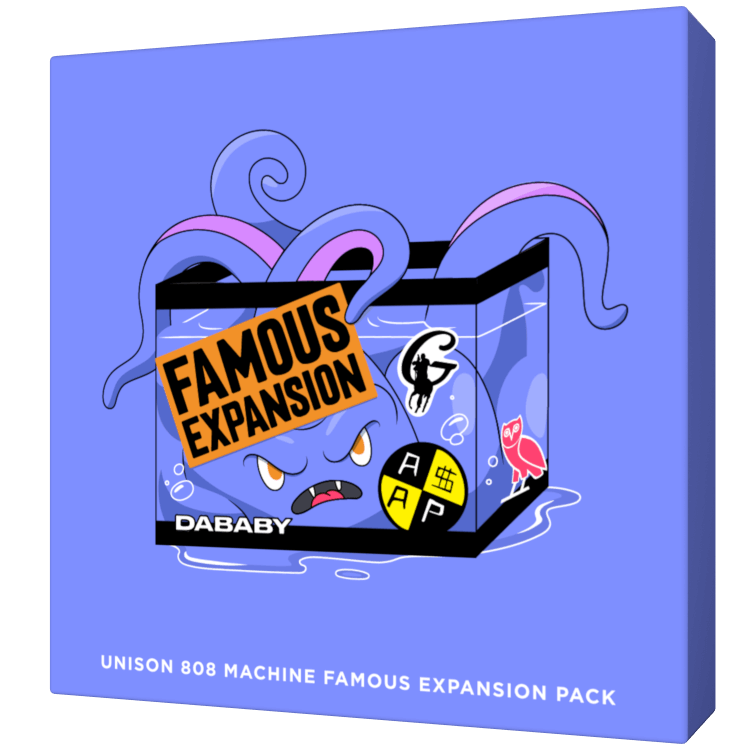
Leave a Reply
You must belogged in to post a comment.